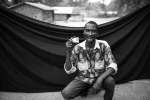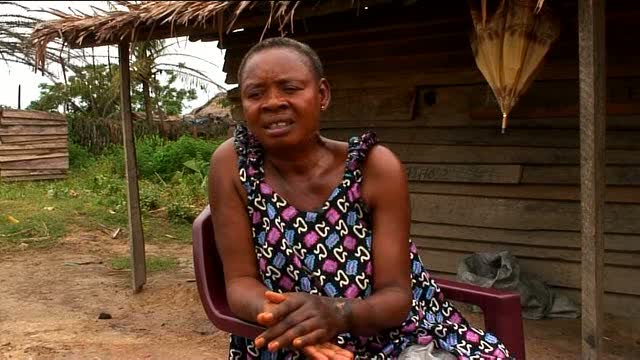- Text size
 |
|  |
|  |
| 
- Français
In Romania, Congolese refugee does as the Romanians do
News Stories, 10 May 2013
BUCHAREST, Romania, May 10 (UNHCR) – Jean-Louis Kialoungou's love affair with Romania began before he even arrived here in the mid-1990s, and over the years the Congolese refugee has become more Romanian than most Romanians.
As Romania prepared for general elections last December, for example, he seemed more concerned than many voters about the fate of his adoptive country. "I asked my colleagues and friends: what do you think about the candidates? Most have no clue!" said Jean Louis, complaining in fluent Romanian about local apathy when it comes to politics.
"For how long are we Romanians going to be treated as inferior to other European nations? What have they got that we haven't?" he asked with a passion that belied not only his African roots but also the fact that, as a refugee, he has no right to vote. He says he is too busy to apply.
Jean-Louis came to Romania from the Republic of Congo 16 years ago, when he was 34. Now – as well as strong views on Romanian politics – he has a stable job, a family and a house, and he has retained the sparkle in his eye and youthful and energetic manner that have helped him overcome adversity.
"I live here, I have a child and I want to see changes for the better," said Jean-Louis, who in 1996 fled a country that was wracked by political turmoil and sliding toward a brief civil war, which erupted in 1997.
He landed at Bucharest airport in October 1996 with his Romanian girlfriend Daniela, whom he met in his homeland and would later marry. They had tickets to fly on to Paris, but planned to first spend a couple of months with Daniela's mother in Romania.
"I don't know what happened. I fell in love with this place and can't really explain it to this day," said Jean-Louis, who now lives in a house with a big garden in Chitila – a satellite town of Bucharest – together with his wife and their 14-year-old daughter, Letitzia.
He works at the BRD Bank in Bucharest, administering money transfers. At home he loves to spend time in his garden, where he cultivates vegetables and grows fruit trees and grapes.
The neighbours in Chitila all know Jean-Louis for being the only "black guy" in the neighbourhood and for his friendly manner; they have even introduced him to tzuica, a traditional home-made Romanian brandy.
"It was easy for me to integrate in Romanian society and I'm proud of that," said Jean-Louis. "When you go somewhere you are the one who has to adapt, you must fight to be accepted, not the other way around."
But a recent episode in central Bucharest, in which a workman shouted racist abuse as Jean-Louis walked past while speaking on his mobile phone, was a reminder that life is still not always easy in overwhelmingly white Romania.
"He thought I was scared of him because he was in a group, but I interrupted my call and stopped to asked him: 'Excuse me, sir. Have I bothered you in any way? Why would you address me that way? You are here doing your job and I'm on my way to mine'," Jean-Louis recalled.
Courage and a strong will have helped Jean-Louis make a home from home in Romania. He also believes that his education in French literature and communication studies in the Republic of Congo helps him relate well to other people.
"You also have to know what you want to do with your life," he noted, claiming that being a refugee in Romania was not necessarily harder than in other countries where there are more opportunities and work is better paid.
"People are good here and the country has potential," he said, "But there are moments, like [the racial abuse] yesterday for instance, when I really miss Africa."
The homesickness struck him while listening to Congolese music sent to him by a friend. "Yesterday, I felt like I was in Congo. If someone had said to me, come on, let's go back there, then I would have left just like that."
In the 21 years since Romania acceded to the UN Refugee Convention, more than 3,550 people have been granted international protection. While Romanian law protects refugees, many struggle to access their rights and rebuild a life in Romania. Last year, received some 2,500 asylum-seekers.
By Andreea Anca in Bucharest, Romania


















































